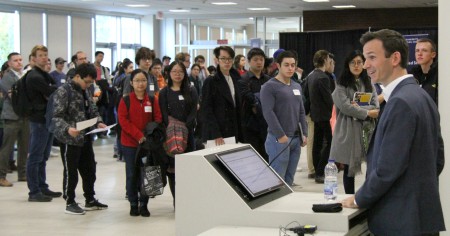
Marc Evans extols the value of graduate studies. He says his MSc. strengthened his technical skills and sped his advancement to a leadership position.
The idea of getting an entry-level job wasn't on Marc Evans' agenda after earning an engineering degree at Ottawa University. Instead, he chose to move to Edmonton and take on a Master's degree at the University of Alberta.
The idea held promise-even though he wasn't sure of what his long-term goals were.
"I wish I could say I had a really good reason for doing a graduate degree-I just didn't know what I wanted yet," he says.
He completed a blended master's degree with engineering management courses and a research project that blended chemical and mechanical engineering, exploring the possibility of using sound waves to affect the viscosity of oilsands.
"The short answer is it doesn't work," said Evans, "but that is still a positive outcome because now someone has worked on the problem extensively and knows the answer."
"When you go into the workforce and you have a graduate degree, you have a better sense of what a proper research program is, what the burden of proof is if you want to make a claim about something."
That graduate degree almost immediately opened doors for the young engineer. He has been working with Med-Eng, a Canadian company that designs and manufactures equipment used by explosive ordinance technicians. In short, he makes bomb-proof suits.
In the six years he has been working with Med-Eng, he has had six jobs-each progressively moving higher into management-level responsibilities.
"For me, the timeline of moving from highly technical roles to produce line manager has been compressed in a big way-many of my colleagues have 25-plus years' experience," he said.
In addition to his dream job, Evans was one of the final 32 candidates in the Canadian Space Agency astronaut selection process earlier this year.
Speaking to a group of undergraduate engineers and recent engineering graduates Oct. 3, Evans pointed out that of those final 32 candidate, most had three university degrees.
The audience also hear from Associate Dean (Outreach) Ania Ulrich, who currently has 16 graduate students under her supervision.
"What I see that really changes in graduate school is your confidence," she said.
"You're working on a problem that no one knows the answer to-not even your professor. You develop this confidence. And one day when you are in a position and you think "Oh I don't know what I'm doing," it's OK because you've been in those situations before."
Evans puts it this way: "I didn't learn how to do explosives research at university-I learned to do research. And the quality of work that we do is a direct result of the education we got in grad school."
For more information on an advanced degree in engineering, visit the U of A Engineering Graduate Studies website.